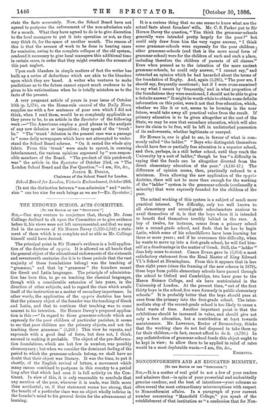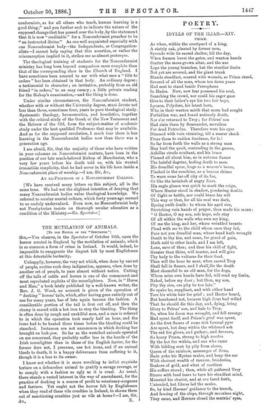NONCONFORMISTS AND AN EDUCATED MINISTRY. [To EKE EDITOR or Tan
"SpEciaTon."1 Sin,—It is a matter of real grief to not a few of your readers and admirers that—in spite of your proverbial and undoubtedly genuine candour, and the best of intentions—your columns so. often reveal the most extraordinary misconceptions with respect. to Nonconformist affairs. In a paragraph of your current number concerning "Mansfield College," you speak of the establishment of that institution as " a confession that for Non-
conformists, as for all others who teach, human learning is a good thing ;" and you further seek to indicate the nature of the supposed change that has passed over the body, by the statemen t that it is now " creditable " for a Nonconformist preacher to be " an instructed divine." As one well acquainted especially with one Nonconformist body—the Independents, or Congregation- alists—I cannot help saying that this assertion, or rather the misconception implied in it, strikes me as almost grotesque.
The theological training of students for the Nonconformist ministry has long been beyond comparison more complete than that of the corresponding class in the Church of England. I have sometimes been amazed to see with what ease a " title to orders " has been obtained in that body. An ordinary degree ; a testimonial to character ; an invitation, probably from an old friend "in orders," to an easy curacy ; a little private reading for the Bishop's examination,—and the thing is done.
Under similar circumstances, the Nonconformist student, whether with or without the University degree, must devote not less than three, sometimes four, years to pure theological study. Systematic theology, hermeneutics, and homiletics, together with the critical study of the Greek of the New Testament and the Hebrew of the Old, form the subject-matter of academic study under the best qualified Professors that may be available. And as for the supposed revolution, I much fear there is less learning in the Nonconformist bodies now than there was a generation ago.
I am afraid, Sir, that the majority of those who have written in your columns on Nonconformist matters, have been in the position of our late much-beloved Bishop of Manchester, who a very few years before his death told us, with his wonted irresistible simplicity, that he had never in his life been inside a Nonconformist place of worship.—I am, Sir, &c., AN EX-PROFESSOR OF A NONCONFORILIST COLLEGE.
[We have received many letters on this subject, all in the same tone. We had not the slightest intention of denying that many Nonconformist bodies value theological knowledge. We referred to secular mental culture, which forty years ago seemed to us unduly undervalued. Even now, no Nonconformist body not Presbyterian insists on thorough secular education as a .condition of the Ministry.—En. Spectator.]





































 Previous page
Previous page